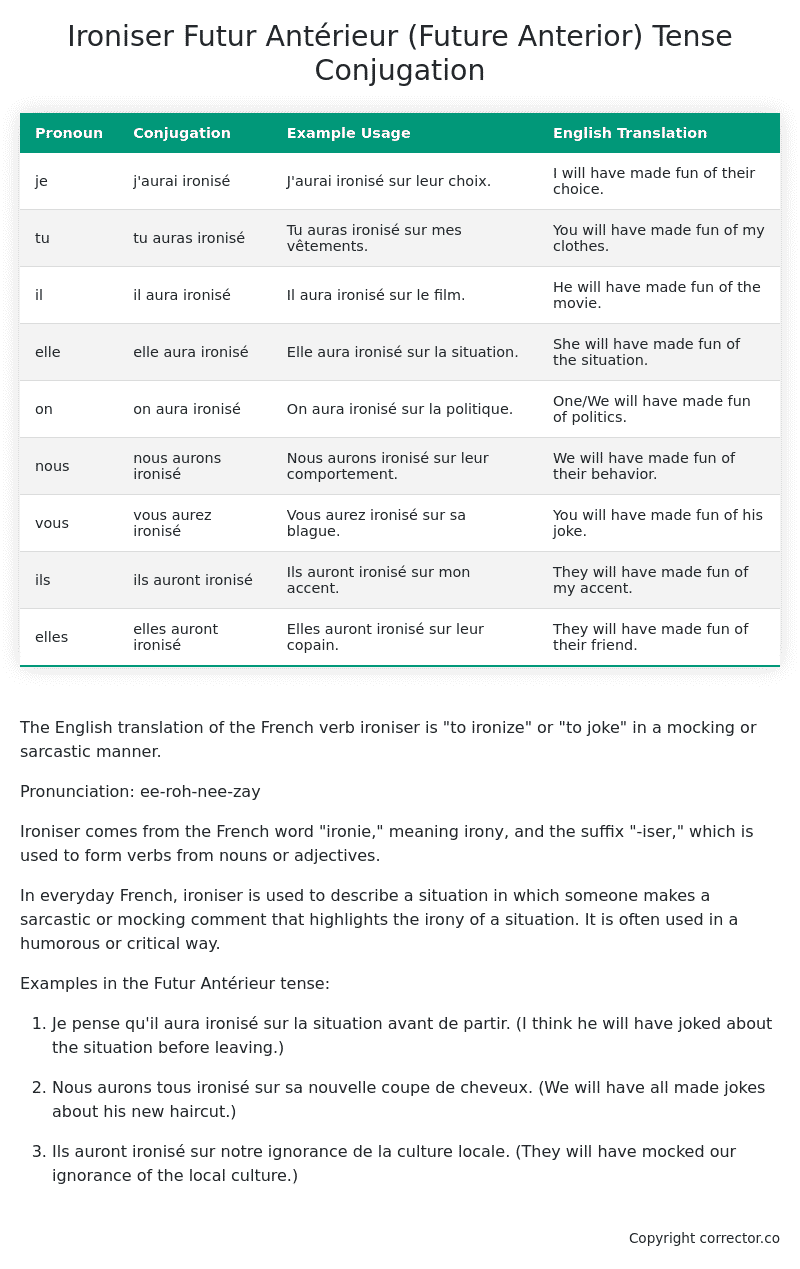Futur Antérieur (Future Anterior) Tense Conjugation of the French Verb ironiser
Introduction to the verb ironiser
The English translation of the French verb ironiser is “to ironize” or “to joke” in a mocking or sarcastic manner.
Pronunciation: ee-roh-nee-zay
Ironiser comes from the French word “ironie,” meaning irony, and the suffix “-iser,” which is used to form verbs from nouns or adjectives.
In everyday French, ironiser is used to describe a situation in which someone makes a sarcastic or mocking comment that highlights the irony of a situation. It is often used in a humorous or critical way.
Examples in the Futur Antérieur tense:
-
Je pense qu’il aura ironisé sur la situation avant de partir. (I think he will have joked about the situation before leaving.)
-
Nous aurons tous ironisé sur sa nouvelle coupe de cheveux. (We will have all made jokes about his new haircut.)
-
Ils auront ironisé sur notre ignorance de la culture locale. (They will have mocked our ignorance of the local culture.)
Table of the Futur Antérieur (Future Anterior) Tense Conjugation of ironiser
| Pronoun | Conjugation | Example Usage | English Translation |
|---|---|---|---|
| je | j’aurai ironisé | J’aurai ironisé sur leur choix. | I will have made fun of their choice. |
| tu | tu auras ironisé | Tu auras ironisé sur mes vêtements. | You will have made fun of my clothes. |
| il | il aura ironisé | Il aura ironisé sur le film. | He will have made fun of the movie. |
| elle | elle aura ironisé | Elle aura ironisé sur la situation. | She will have made fun of the situation. |
| on | on aura ironisé | On aura ironisé sur la politique. | One/We will have made fun of politics. |
| nous | nous aurons ironisé | Nous aurons ironisé sur leur comportement. | We will have made fun of their behavior. |
| vous | vous aurez ironisé | Vous aurez ironisé sur sa blague. | You will have made fun of his joke. |
| ils | ils auront ironisé | Ils auront ironisé sur mon accent. | They will have made fun of my accent. |
| elles | elles auront ironisé | Elles auront ironisé sur leur copain. | They will have made fun of their friend. |
Other Conjugations for Ironiser.
Le Present (Present Tense) Conjugation of the French Verb ironiser
Imparfait (Imperfect) Tense Conjugation of the French Verb ironiser
Passé Simple (Simple Past) Tense Conjugation of the French Verb ironiser
Passé Composé (Present Perfect) Tense Conjugation of the French Verb ironiser
Futur Simple (Simple Future) Tense Conjugation of the French Verb ironiser
Futur Proche (Near Future) Tense Conjugation of the French Verb ironiser
Plus-que-parfait (Pluperfect) Tense Conjugation of the French Verb ironiser
Passé Antérieur (Past Anterior) Tense Conjugation of the French Verb ironiser
Futur Antérieur (Future Anterior) Tense Conjugation of the French Verb ironiser (this article)
Subjonctif Présent (Subjunctive Present) Tense Conjugation of the French Verb ironiser
Subjonctif Passé (Subjunctive Past) Tense Conjugation of the French Verb ironiser
Subjonctif Imparfait (Subjunctive Imperfect) Tense Conjugation of the French Verb ironiser
Subjonctif Plus-que-parfait (Subjunctive Pluperfect) Tense Conjugation of the French Verb ironiser
Conditionnel Présent (Conditional Present) Tense Conjugation of the French Verb ironiser
Conditionnel Passé (Conditional Past) Tense Conjugation of the French Verb ironiser
L’impératif Présent (Imperative Present) Tense Conjugation of the French Verb ironiser
L’infinitif Présent (Infinitive Present) Tense Conjugation of the French Verb ironiser
Struggling with French verbs or the language in general? Why not use our free French Grammar Checker – no registration required!
Get a FREE Download Study Sheet of this Conjugation 🔥
Simply right click the image below, click “save image” and get your free reference for the ironiser Futur Antérieur tense conjugation!

Ironiser – About the French Futur Antérieur (Future Anterior) Tense
Construction
Common Everyday Usage Patterns
Interactions with Other Tenses
For example
Summary
I hope you enjoyed this article on the verb ironiser. Still in a learning mood? Check out another TOTALLY random French verb conjugation!


